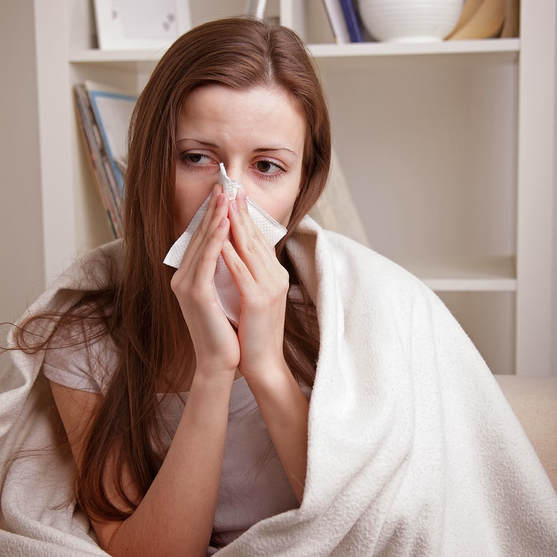|
This is a topic that not a lot of people pay attention to, when they really should because, although a common topic, does hold people back from their training which is building lean muscle and losing body fat.
A common cold can take up to two weeks to fully recover from, which can set your training back, because you may miss training sessions, you might not be working to the right intensity, you're not eating well or you're not consuming the right amount of calories. So it is worth addressing, and there are several things you can do to reduce your likelihood of getting sick in the first place. Not a lot of people understand the science behind staying healthy and why we're so prone to getting sick. We know that in the winter months, there is a rise in sicknesses during the winter time. But why is that? When I was younger I was told: "You have to wrap up and stay warm or you'll catch a cold." Of course in reality this is not true because low temperatures do not relate to us catching a cold. Other theories about why we catch a cold: Are there more germs around? No! In fact science shows that there are less germs in many parts of the world in winter time, but yet more people are sick, so that doesn't really tie together.... Is it because we're inside more during the winter? Well...there is some truth behind this, although many people are still working 9-5 jobs and spending relatively the same amount of time outside as they are in the summer time. The theory that holds the most weight as to why we are more susceptible to falling ill over the winter is a direct relation to our body's own production of vitamin D. Vitamin D is produced by being exposed to certain UV rays which come from the sun. Our vitamin D production is directly related to our immune systems' strength. That is one variable that cannot be ignored and is why a lot of people feel we are so susceptible to illnesses during the winter. Our vitamin D production is drastically reduced during the winter months. What about Vitamin C? Well, I'm sorry but no amount of vitamin c is going to help you avoid a cold. That is a myth! However, vitamin C does help you manage a cold (once you've got one). That brings me onto the tips: 1. Go outside during the day Ideally spend 30 - 60 mins a day outside exposed to the sun. You do not necessarily need to be in direct sunlight. 2. Consume foods with vitamin D Foods to stock up on for vitamin D production include egg yolks, fish, meats, garlic (superfood). 3. Consume antioxidant foods Berries, fruits, cocoa, vegetables, teas. There are many great antioxidant features of teas. The best two in my opinion are green tea and chamomile. 4. Consume 1 ingredient foods Focus on eating foods that are one ingredient foods and eliminate the processed stuff and artificial sweeteners (which you should be doing all year round anyway!) You don't want your body having to go through all the processes of dealing with all the junk coming in. 5. Take a good quality multivitamin daily As much as I promote eating good quality foods, including fresh fruit and vegetables, you have to face reality and realise that even if you eat your 5 a day target (which in realistically should be 10 a day), you're probably not getting the amount of vitamins and minerals you need. It's partly because you might not be eating enough, but also because modern day farming and manufacturing processes degrades the soil quality in which the food is grown, so the amount of vitamins and minerals in today's fruit and veg, is much less than that of 20 years ago. To bridge the gap between what you eat and what you need, you should consider taking a decent quality multivitamin tablet. 6. Exercise regularly When I say exercise, I mean intense activity that gets your heart rate up and gets you puffed. Walking doesn't cut it. You should be doing 20-60 minutes of intense exercise 3-5 times per week. If you're exercising beyond 45 minutes at a time, you are likely sacrificing intensity. You can either train hard or train long. You can't do both. Opt for hard, over long, drawn out workouts. The benefits of High Intensity Interval Training (HIIT) far outweigh those of low intensity continuous style training (LICT), and you save yourself time in the process. A new study from Karolinska Institutet in Sweden shows that the same mechanisms behind the beneficial effects of exercise training on the brain also help to counteract fat and to strengthen the immune system. Check out the study here 7. Get enough sleep/rest When you are sleeping it is when your body carries out essential healing and repairing processes and when you disrupt this or cut it short, you are severely hindering your ability to function optimally. One of the many side-effects of poor sleep is weakened immune system defences, which opens the doors for illnesses ranging for the common cold all the way to cancer! Check out my blog on how to sort out your sleep issues
0 Comments
Leave a Reply. |
Services |
Company |
|
|
© COPYRIGHT 2015. ALL RIGHTS RESERVED.
|
Website Design by My PT Website
|


 RSS Feed
RSS Feed